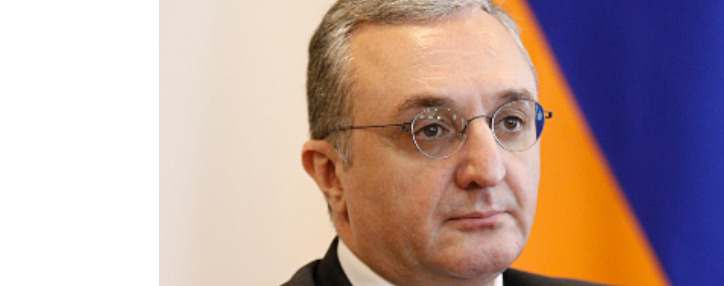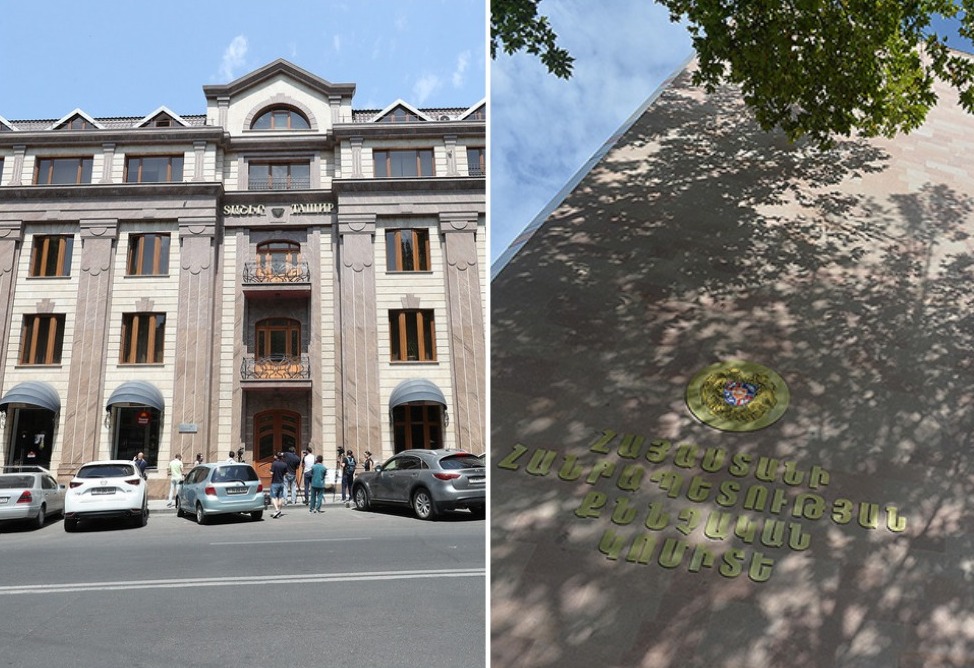Karabakh has decisive voice in conflict regulation, minister says
04.06.2018,
15:46
In an interview with the Armenian Service of RFE/RL Armenia’s Minister of Foreign Affairs Zohrab Mnatsakanyan said he was flying to Moscow on June 7 for a meeting with his Russian counterpart Sergey Lavrov to discuss new efforts for the resolution of the Nagorno-Karabakh conflict.

YEREVAN, June 4. /ARKA/. In an interview with the Armenian Service of RFE/RL Armenia’s Minister of Foreign Affairs Zohrab Mnatsakanyan said he was flying to Moscow on June 7 for a meeting with his Russian counterpart Sergey Lavrov to discuss new efforts for the resolution of the Nagorno-Karabakh conflict.
According to the minister, there is one clear reality - Nagorno-Karabakh has a decisive voice in the process of the peaceful settlement of the conflict.
The minister recalled that the issue was discussed by Prime Minister Nikol Pashinyan with Russian President Vladimir Putin in early May in Russian Sochi. He said it was discussed also in a telephone conversation which he had with the co-chairs of the OSCE Minsk Group, and also with visiting US Deputy Secretary of State and French Foreign Minister in Yerevan and also in a telephone conversation with Lavrov.
Mnatsakanyan reiterated that Nagorno-Karabakh has the decisive voice in the Karabakh peace process, because, after all, the conflict is called ‘Nagorno-Karabakh conflict.’
‘Nagorno-Karabakh has its own territory, population, government, parliament and so on. It is a unit that can hardly be ignored. "This is the reality and in this process Armenia has been and remains a supporter of a peaceful settlement through negotiations within the framework of the Minsk Group," Mnatsakanyan said.
Zohrab Mnatsakanyan stressed also the importance of the peaceful atmosphere, saying it has a key, vital significance for the resolution of the conflict. He said numerous statements and calls that lead to the opposite direction are very concerning.
The Nagorno-Karabakh conflict erupted into armed clashes after the collapse of the Soviet Union in the early 1990s as the predominantly Armenian-populated enclave of Azerbaijan sought to secede from Azerbaijan and declared its independence backed by a successful referendum.
On May 12, 1994, the Bishkek cease-fire agreement put an end to the military operations. A truce was brokered by Russia in 1994, although no permanent peace agreement has been signed.
Since then, Nagorno-Karabakh and several adjacent regions have been under the control of Armenian forces of Karabakh. Nagorno-Karabakh is the longest-running post-Soviet era conflict and has continued to simmer despite the relative peace of the past two decades, with snipers causing tens of deaths a year.
On April 2, 2016, Azerbaijan launched military assaults along the entire perimeter of its contact line with Nagorno-Karabakh. Four days later a cease-fire was reached. -0---
According to the minister, there is one clear reality - Nagorno-Karabakh has a decisive voice in the process of the peaceful settlement of the conflict.
The minister recalled that the issue was discussed by Prime Minister Nikol Pashinyan with Russian President Vladimir Putin in early May in Russian Sochi. He said it was discussed also in a telephone conversation which he had with the co-chairs of the OSCE Minsk Group, and also with visiting US Deputy Secretary of State and French Foreign Minister in Yerevan and also in a telephone conversation with Lavrov.
Mnatsakanyan reiterated that Nagorno-Karabakh has the decisive voice in the Karabakh peace process, because, after all, the conflict is called ‘Nagorno-Karabakh conflict.’
‘Nagorno-Karabakh has its own territory, population, government, parliament and so on. It is a unit that can hardly be ignored. "This is the reality and in this process Armenia has been and remains a supporter of a peaceful settlement through negotiations within the framework of the Minsk Group," Mnatsakanyan said.
Zohrab Mnatsakanyan stressed also the importance of the peaceful atmosphere, saying it has a key, vital significance for the resolution of the conflict. He said numerous statements and calls that lead to the opposite direction are very concerning.
The Nagorno-Karabakh conflict erupted into armed clashes after the collapse of the Soviet Union in the early 1990s as the predominantly Armenian-populated enclave of Azerbaijan sought to secede from Azerbaijan and declared its independence backed by a successful referendum.
On May 12, 1994, the Bishkek cease-fire agreement put an end to the military operations. A truce was brokered by Russia in 1994, although no permanent peace agreement has been signed.
Since then, Nagorno-Karabakh and several adjacent regions have been under the control of Armenian forces of Karabakh. Nagorno-Karabakh is the longest-running post-Soviet era conflict and has continued to simmer despite the relative peace of the past two decades, with snipers causing tens of deaths a year.
On April 2, 2016, Azerbaijan launched military assaults along the entire perimeter of its contact line with Nagorno-Karabakh. Four days later a cease-fire was reached. -0---



